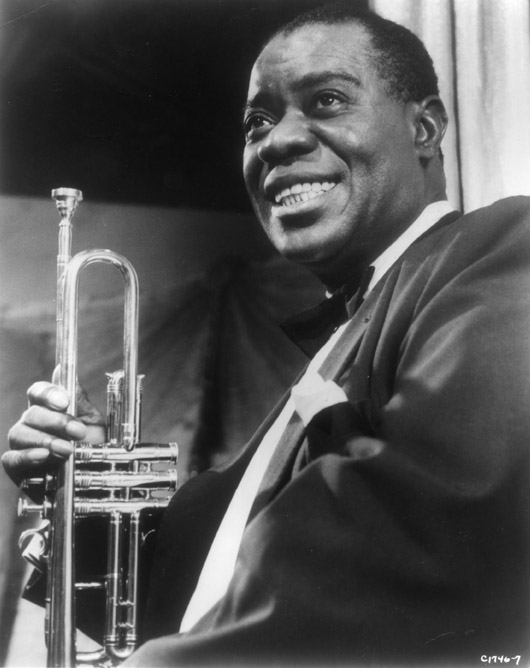Life & Legacy
Louis Armstrong was the most important and influential musician in jazz history. Although he is often thought of by the general public as a lovable, clowning personality, a gravel-voiced singer who played simple but dramatic trumpet in a New Orleans-styled Dixieland setting, Armstrong himself was so much more.
One of the first soloists on record, Louis was at the forefront of changing jazz from ensemble-oriented folk music into an art form that emphasized inventive solo improvisations. His relaxed phrasing was a major change from the staccato style of the early 20’s and helped to set the stage for the Swing Era. Armstrong demonstrated that it was possible to have both impressive technique and a strong feeling for the blues. One of jazz's first true virtuosos, his influence over his contemporaries was so powerful that nearly every trumpeter to record between 1927 and 1940 sounded like one of his followers!
Louis Armstrong's unique singing voice was imitated by a countless number of listeners through the years. His popularized scat singing (using nonsense syllables rhythmically rather than words) and his phrasing (carried over from his horn playing) affected virtually every singer to emerge after 1930, including Bing Crosby, Billie Holiday, and Frank Sinatra. In addition, Louis Armstrong's accessible humor and sunny stage personality were major assets in popularizing jazz with larger audiences. Many youngsters were inspired to take up the trumpet after hearing or seeing him and millions more were introduced to jazz through Armstrong.
Louis Armstrong, who was affectionately called “Satchmo” by his friends, never boasted that he invented jazz, or for that matter that he was even one of its better players. But anyone who has heard his inimitable style must agree that Louis Daniel “Satchmo” Armstrong was perhaps the best there has ever been. The worldwide popularity of jazz can be directly attributed to his infectious style of performance and the unselfishness that characterized his persona.
Armstrong worked at various unskilled jobs as a youth. He sold coal and had a youthful propensity for mischief. On a dare from a friend, he fired a pistol on South Rampart Street, for which he received an 18 month sentence at the Colored Waif’s home, where he eventually came under the musical influence of “Captain” Peter Davis. Sensing that Armstrong possessed a burning desire to learn music, Davis provided basic musical training on the cornet to young Louis. With that kind gesture, the history of popular music was undoubtedly re-written.
By 1922, young Satchmo was ready to join his idol’s band, Joe “King” Oliver’s Creole Jazz Band in Chicago. By the time of his arrival in the Windy City, he had become an accomplished musician. Part of the influence that Armstrong brought to Chicago was an incredible street training in the back alleys and clubs of the Big Easy’s Storyville.
By the early ‘30s, Armstrong’s popularity had reached such epic proportions that he and his band toured Europe, a major milestone for any performer, especially a young black musician. As the years passed, Armstrong’s persona and star appeal continued to grow. Satchmo’s popularity never waned during his entire life. He played for presidents, European royalty, and the kings and queens of his beloved Africa. He frequently toured internationally as a special envoy for the U.S. State Department, representing his country and New Orleans with human quality, dignity, charm, and excellence. At every stop he made in over a half century of performing, he always promoted his love for New Orleans and an avowed passion for red beans and rice. But of all the accolades, he counted his greatest as being selected Zulu King of Mardi Gras 1946.
In an August 1991 commemorative article on Armstrong’s career, The New York Times stated, “The power of his genius, combined with his living manner, forced whites to rethink their racism, whether they knew it or not.” Louis Armstrong: a giant who helped shape New Orleans and America.
"Armstrong's improvisational verve and technical virtuosity defined jazz...and his engaging personality and ever-present grin made him a natural as the international ambassador of jazz, America's greatest gift to the world." ~Life Magazine ~ The 100 People Who Made The Millennium
"He left an undying testimony to the human condition in the America of his time." ~Wynton Marsalis

